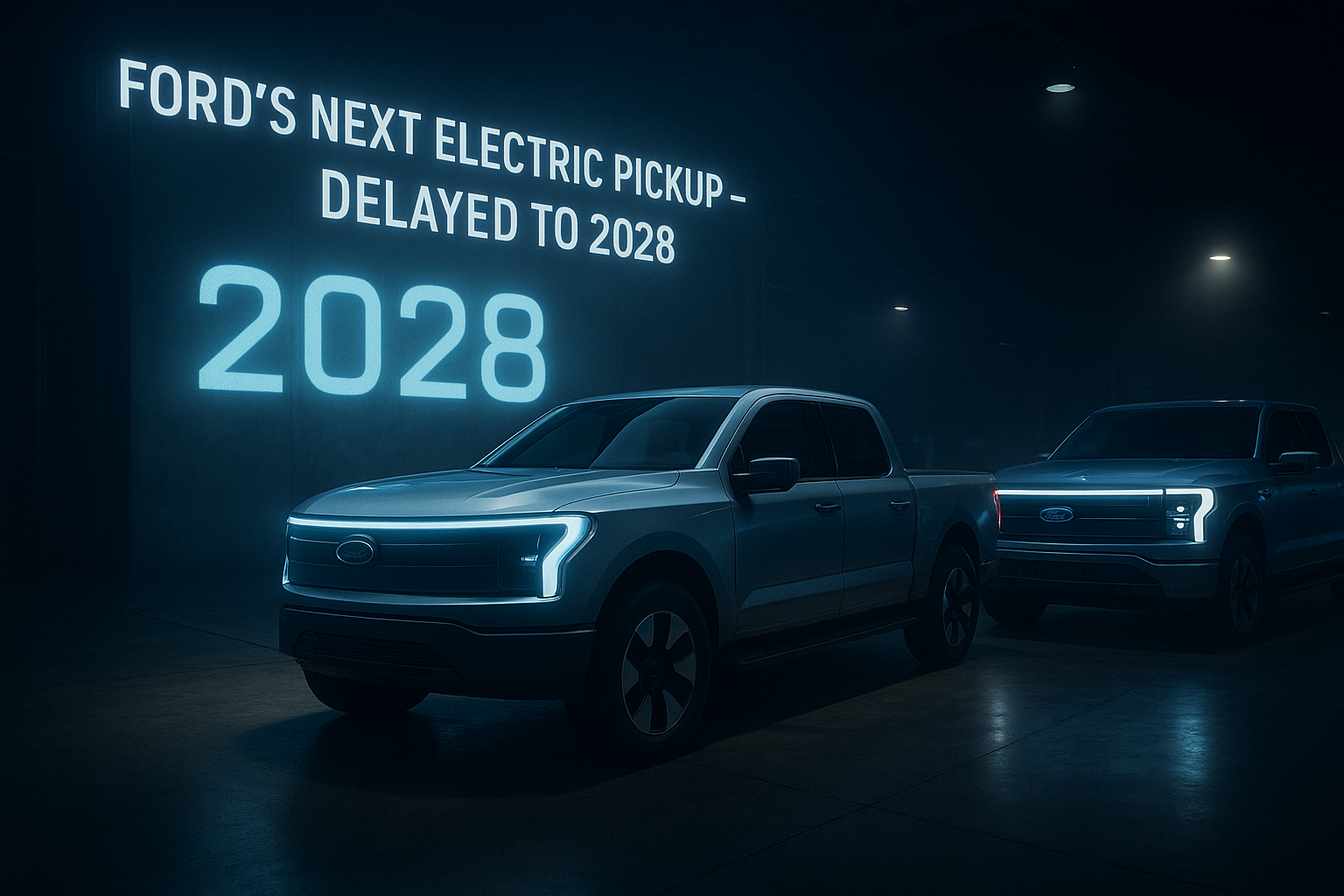If you’ve been eagerly waiting for Ford’s next-generation electric pickup to roll into dealerships, you might want to take a seat. The automaker has just announced that the much-anticipated launch is being pushed back to 2028. For fans of the
Ford pickup truck legacy, that’s a pretty long pit stop. But this isn’t just about moving a date on a calendar; it’s about a strategic shift that could reshape Ford’s entire EV game plan.
Let’s unpack the reasons, the ripple effects, and what it means for both the company and drivers.
Why the Delay? A Closer Look at Ford’s Strategy
Ford’s upcoming electric pickup, internally known as “Project T3”, was initially expected around 2025 or 2026. Now, it’s officially three years behind schedule. So, what happened?
A Strategic Shift Toward Smaller, More Affordable EVs
Ford’s leadership is rethinking the EV lineup. Rather than focusing solely on large, high-priced models, they’re pivoting toward smaller, budget-friendly electric vehicles. This is partly in response to intense global competition, especially from Chinese automakers who are producing lower-cost, tech-loaded EVs that are flooding markets worldwide.
CEO Jim Farley described this pivot as a “Model T moment”, a nod to Ford’s history of making cars affordable for the masses. That’s a bold statement, but it shows the scale of the ambition. Instead of chasing luxury buyers alone, Ford wants to democratize EV ownership.
In practice, this means pausing certain high-cost projects, like the new electric pickup, while accelerating the development of a versatile, low-cost EV platform that could support sedans, crossovers, and even a compact pickup.
Mounting Financial Pressures and Profitability Challenges
There’s no sugarcoating it: Ford’s EV operations are expensive right now.
According to
Reuters, the company expects to lose $5.5 billion on its EV and software divisions in 2025.
When you’re burning through billions, every major product decision becomes critical. Large pickups are not only resource-intensive to build, but also expensive for consumers to buy, which makes it harder to move units in a slowing economy. Delaying the electric pickup allows Ford to reallocate funds toward projects with a higher probability of near-term profitability.
Quality Issues and Recall Risks
Ford’s recent history with quality control has been, well, bumpy. The brand has led the U.S. industry in recalls for multiple years running. With a vehicle as complex as a next-gen electric pickup, rushing to market could mean even more costly recalls and damage to the brand’s reputation.
By taking extra time, Ford can refine manufacturing processes, improve testing, and ensure the truck meets both safety and durability expectations. In the EV world, where trust in new technology is still building, quality is everything.
Waiting for Better, Cheaper Battery Tech
Batteries are the beating heart of any EV, and they’re also the most expensive part. Right now, the industry is shifting toward lithium-iron-phosphate (LFP) batteries, which are cheaper, safer, and less prone to performance degradation over time.
Ford is licensing LFP technology from Chinese battery giant CATL. Delaying the electric pickup gives the company time to integrate these more cost-efficient batteries, which could dramatically improve both profit margins and affordability for customers.
Supplier Coordination & Cost Management
You can’t just hit pause on a project without impacting dozens of suppliers. Ford has been working to align timelines with its partners, some of whom were preparing to scale production for the original 2025/2026 launch.
By pushing the date to 2028, Ford can better synchronize with suppliers, lock in better pricing for components, and avoid last-minute logistical headaches. This is especially important when developing an all-new EV platform, which requires precision planning across multiple production sites.
The Bigger Picture for Ford’s EV Roadmap
So, with the electric pickup benched until 2028, what’s Ford’s plan in the meantime?
The F-150 Lightning Carries the Torch
The F-150 Lightning will remain
Ford’s flagship electric truck for now. It’s already proven itself with solid sales, strong towing capacity, and a design that feels familiar to traditional pickup buyers.
While it may not have the new features the next-gen truck promises, the Lightning still plays a critical role in Ford’s EV strategy, keeping the brand relevant in the electric truck market while new models are in development.
A Smaller Electric Pickup Is Coming Sooner
Interestingly, Ford’s not abandoning pickups altogether in the near term. The company is expected to launch a smaller, more affordable electric pickup around 2027. This could be the first product to debut on Ford’s new low-cost EV platform.
Rumors suggest it might revive the Ranchero name, a nostalgic callback for older Ford fans, but with an entirely modern twist. If true, this could open the EV truck segment to a much wider audience, especially those who find today’s large electric pickups too expensive or too big for daily use.
Positioning for a Changing Market
The EV market is evolving quickly. In 2020, the conversation was all about high-end models and early adopters. Now, as EV adoption broadens, the focus is shifting to affordability, charging infrastructure, and real-world utility.
Ford’s delay is less about abandoning big trucks and more about timing, entering the market with the right product at the right price. If the 2028 electric pickup can launch with cutting-edge battery tech, competitive pricing, and proven quality, it could hit the sweet spot for mass-market appeal.
Conclusion
While it’s easy to focus on the disappointment of a delay, there’s also an opportunity here. Ford is signaling that it’s playing the long game, investing in affordability, quality, and technology rather than rushing to keep up with rivals in the short term.
For buyers, this could mean the wait is worth it. The eventual 2028 launch might deliver a Ford pickup truck that not only meets expectations but exceeds them in terms of range, capability, and price. In the meantime, the Lightning continues to anchor Ford’s EV presence, while a smaller, potentially game-changing model arrives in 2027.
So yes, the
new Ford pickup trucks we’ve been daydreaming about are taking a little longer to get here. But if Ford’s “Model T moment” really pays off, the delay could mark the beginning of a much bigger shift, one that makes electric pickups a truly mainstream choice.


